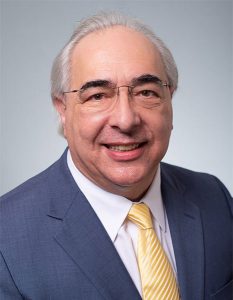A dental school dean with a history of publishing cancer research papers is up to five retractions.
Russell Taichman, the dean of the University of Alabama at Birmingham’s school of dentistry, lost two papers in Cancer Research earlier this month, after losing three others since 2020. Most of the retractions came after PubPeer comments about duplicated images in some of the papers.
In April of 2020, Elisabeth Bik commented on two of Taichman’s papers that would later be retracted, pointing out potentially recycled images between the articles.
None of the authors responded on PubPeer, but Taichman apparently took her comments to heart, and credited her in a retraction notice.
The retraction notice for “Diverse signaling pathways through the SDF-1/CXCR4 chemokine axis in prostate cancer cell lines leads to altered patterns of cytokine secretion and angiogenesis,” originally published in 2005 in Cellular Signalling, stated that the corresponding author, Taichman, requested the action:
This article has been retracted at the request of the authors. The corresponding author would like to retract the above paper as Dr. Elisabeth Bik pointed out that some of the figures including Figure 1B, and Figure 6A were duplicated. The corresponding author wishes to convey sincere regret to the editor and readers of the journal of Cellular Signalling.
Taichman, who had been at the University of Michigan School of Dentistry in Ann Arbor when all five retracted papers were originally published, did not respond to our request for comment.
The other paper Bik flagged was “A Glycolytic Mechanism Regulating an Angiogenic Switch in Prostate Cancer,” published in Cancer Research in 2007. It was retracted last March. Its notice stated:
This article (1) is being retracted at the request of the authors. The images used in the second and third panels of CXCR4 siRNA in Fig. 1B were duplicated from the first and second panels of PC3-control cells in Fig. 1B of a previously published article that has since been retracted (2). The authors apologize to the scientific community and deeply regret any inconveniences or challenges resulting from the publication and subsequent retraction of this article.
A copy of this retraction notice was sent to the last known email addresses for 13 of the 13 authors. Ten authors (Jinlu Dai, Younghun Jung, Yu Wang, Aaron M. Havens, Phillip J. Hogg, Evan T. Keller, Kenneth J. Pienta, Jacques E. Nor, Cun-Wu Wang, Russell Taichman) agreed to the retraction; three authors (Jianhua Wang, Jincheng Wang, and Chuen-Long Wei) did not respond.
The next retraction, of a 2008 paper in the Journal of Biological Chemistry, “The role of CXCR7/RDC1 as a chemokine receptor for CXCL12/SDF-1 in prostate cancer,” came in July of this year.
Per the journal’s editorial policies, which editor-in-chief Alex Toker of Beth Israel Deaconess Medical Center pointed us to, the action was called a “withdrawal” because it was taken by the authors rather than the publisher. (We do not draw that distinction in our database.) The notice stated:
This article has been withdrawn by the authors to correct the scientific record, except for Jianhua Wang who could not be contacted. The journal analysis and the authors conclude that in Figure 5C, the C4-2BCXCR7 panel has been rotated and reused as the C4-2BsiControl panel. Due to primary data for C4-2BsiControl panel not supporting the original conclusions, the authors wish to withdraw this article.
Two more articles were retracted from Cancer Research earlier this month: “CXCR6 Induces Prostate Cancer Progression by the AKT/Mammalian Target of Rapamycin Signaling Pathway,” from 2008, and “Characterization of Phosphoglycerate Kinase-1 Expression of Stromal Cells Derived from Tumor Microenvironment in Prostate Cancer Progression,” from 2010. Both notices identify recycled figures (which, for the later paper, PubPeer commenters had noted starting in May 2020) and state that Taichman agreed to the retraction.
All five papers have Jianhua Wang as the first author. Wang, who was affiliated with Michigan for some of the papers and Shanghai Jiao-Tong University School of Medicine in China for others, did not respond to our request for comment.
Like Retraction Watch? You can make a tax-deductible contribution to support our work, follow us on Twitter, like us on Facebook, add us to your RSS reader, or subscribe to our daily digest. If you find a retraction that’s not in our database, you can let us know here. For comments or feedback, email us at [email protected].

This sort of thing is disgusting to an old fogey like me. I wonder what it would take to at least curtail this kind of shameful behavior. Maybe shaming them in front of their peers or friends? Apparently the officials in the University don’t care or are too cowardly to do anything. Or maybe just some financial ties. I guarantee you that unless pressure is applied nothing will happen. Thank God for Retraction Watch and the work they do. At last someone is acting as the conscience of honest science. Keep up the good work.
Thanks to you, too, for stating the right thing,
there are people who have the courage to lie,
but not to apologize -which is already known not to take back the damage done.
A.,
Argentine
Gracias a usted también, por afirmar lo correcto,
hay personas que tienen coraje para mentir,
pero no para disculparse -que ya se sabe que no retira el daño producido.
A.